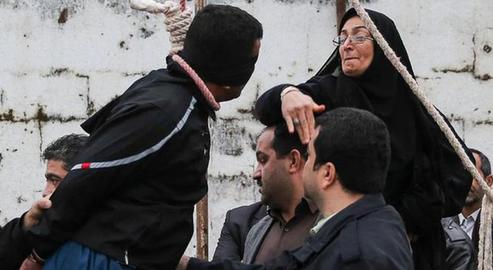Earlier this week, Iran Human Rights shared the appalling news that a woman had been executed in Rasht Central Prison at the hands of her own daughter.
Maryam (Masoumeh) Karimi was sentenced to qisas (retribution) more than 13 years ago for having killed her husband, who was reportedly abusive and had refused to separate from her. In accordance with the rules of qisas, Karimi’s execution by hanging was carried out on Monday, March 15 by her estranged daughter, as the victim’s official next of kin.
For unknown reasons, Karimi’s father – her co-accused in the killing – was not executed on the same day. But he was brought to the gallows by prison officers to see her corpse.
The manner of the execution has shocked many Iranians and the wider human rights community. But it took place entirely within the existing legal framework of the Islamic Republic. The outdated punishment of qisas for those convicted of murder is routinely used by the judiciary to impose responsibility for their execution on ordinary Iranian citizens.
Retribution as an Exercise in Blame-Shifting
Mahmoud Amiry-Moghadam, director of Iran Human Rights, says the Islamic Republic endorses next of kin-led executions such as this in an attempt to show an outraged international community that the death penalty is the people's demand.
"In previous years,” he tells IranWire, “when the Islamic Republic was questioned by the UN Human Rights Council about retribution, the representatives of the Islamic Republic argued that it was a citizen's right. The judiciary is trying to legitimize this argument in various ways, including entrusting the execution of the sentence to blood relatives."
Members of the Iranian regime also defend the law of qisas (retribution) by saying a murder victim’s next of kin have the right to pardon the convict. However, the absence of a proportionate alternative punishment, according to many anti-death penalty activists in Iran, remains a chief obstacle as victims’ families often feel they have no other recourse to justice. In some cases, such as the execution of wrestler Navid Afkari last September, it is also not clear whether the victim’s family has been given the opportunity to express whether or not they consent to a pardon.
Do Iranians Support Retributive Justice?
Mahmoud Amiry-Moghaddam also notes the fact that a death sentence has been carried out by a member of the victim’s family is, by itself, not enough to show that qisas and the death penalty enjoy popular support in Iran. In fact, despite the regime’s efforts, some surveys indicate that most Iranians do not support qisas at all.
"In a poll conducted last year,” he says, “for GAMAAN [the Group for Analyzing and Measuring Attitudes in Iran] and the World Coalition Against the Death Penalty, around 20,000 people were asked whether they would consent to retribution for the murder of a family member. More than 70 percent of respondents answered in the negative.
“This shows that firstly, contrary to the claims of the Islamic Republic, retribution is not a public demand – at least among the current generation of Iranians – and secondly, the government has not been very successful in normalizing and promoting violence in society through retribution."
According to a poll conducted by GAMAAN in September 2020, about 44 percent of Iranian citizens actively oppose the death penalty. About 26 percent of respondents said they only agree with the death penalty in certain specific cases, such as those of serial murder and rape.
In recent years the Islamic Republic has also defended the use of qisas on the basis that it works as a deterrent against crimes such as murder. But even official reports show that this is baseless, with violent crime still on the rise and officials calling for a “precautionary” rather than punitive approach.
Amiry-Moghaddam believes that contrary to what the Islamic Republic has posited in the past, retribution is not the demand of the majority of citizens or a deterrent, but rather has come about because of the state’s particular interpretation of Sharia law. He notes that the Iranian penal code also contains some notable exceptions: "In the Islamic Penal Code, the father and paternal grandfather are exempt from retribution for killing their children. Fathers are allowed to murder their spouses or daughters on suspicion of having an illicit affair."
The director of Iran Human Rights adds: "In addition to this, anyone who kills a non-Muslim citizen whose religion is not one of the officially-recognized [minority] religions in the Islamic Republic, is also exempt. This has led to the killing of Baha'i citizens, for instance, because of personal differences, without the killer worrying about reprisal.
“An overview of the law of retribution shows that the Islamic Republic, as an oppressive and religious government, deploys the people themselves to exclude other citizens. The representatives for the Islamic Republic in international institutions have repeatedly called retribution the ‘red line’ of the state, which cannot be objected to."
Divorce Laws Create the Conditions for Spousal Murder
In Iran, husbands can murder their wives and daughters with the full protection of the law on the pretext of their having illicit relationships. In contrast, several social studies indicate that most cases of Iranian women murdering their husbands come about as a result of protracted, long-term violence in the relationship, from which women in Iran cannot obtain a divorce without their husbands’ consent. This appears to be true in the case of Maryam Karimi.
Saeed Madani, a sociologist and social researcher, tells IranWire: "Since the beginning of the 2001s, academic studies have expanded and confirmed an increase in murders of husbands by wives in Iran. Most of the women who committed murder were repeat victims of violence and physical abuse by their husbands. In fact, they considered the murder of their spouse the only means of escape."
Many of these women, he adds, had filed for divorce and been blocked by their husbands, who have to give consent under Iranian law for the process to go ahead. "In many of these cases,” Madani says, “husbands with drug addictions had forced their wives into prostitution to pay for their lifestyles. One of these studies, conducted by the University of Tehran, emphasized that if these women had had recourse to divorce, the likelihood of such crimes would be significantly reduced."
The study Madani cited also found that more than half of the women who had committed murder were married as children. Based on its findings, Madani says he believes existing criminal law in the Islamic Republic is exacerbating murder rates, rather than reducing them: “In this study, a comparison was made between the motives of husbands who killed their wives with the motives of wives who killed their husbands.
“It is striking that a far higher proportion of women than men had a motive and had planned to kill their husbands. In contrast, many men killed their wives in a moment of madness and anger, in a non-premeditated way. Long-term violence is one of the main reasons for this difference. By the same token, many of these crimes would never have taken place if these women had been given effective protection against domestic violence, or if the law granted them the right to divorce."
Is Retribution Defensible in Islamic Law?
Representatives of Islamic Republic have long insisted on the continuation of qisas sentencing. When faced with international condemnation, these same individuals have insisted it is an integral part of the “religious” nature of Islamic laws.
In one statement, Majid Takht-e-Ravanchi, a former deputy foreign minister and current representative of the Islamic Republic to the United Nations, called retribution a "red line" for the Islamic Republic and said it was enshrined in the Quran.
Legal expert Mohammad Oliaeifard told IranWire that in fact, retribution is not considered a prerequisite under Islamic law and the judge can suspend it in the national interest. "In the time of the Prophet,” he says, “the sentence of retribution was considered progressive compared to the common culture at the time. Then, it was customary to kill several members of a tribe in revenge for the killing of one person. In this social context the Prophet of Islam told his followers that in dealing with a person who was killed, only the killer should be killed in exchange. Therefore, according to the era and situation, a measure of proportionality can be introduced between the crime and the punishment."
Part of the reason qisas would have been acceptable at the time, Oleifard points out, is because at that point in history the state had not yet taken responsibility for meting out justice between citizens. "Retribution was carried out at a time when the people themselves punished criminals instead of the courts. But in the present, when the state legislates and enforces the law, it can no longer be right that citizens are responsible for enforcing the sentence."
He added: "In most societies, punishment for murder has changed from retribution to long-term imprisonment. But the Islamic Republic still resists this transformation. In pre-Islamic times, although there was a law of retribution for murder, it was only rarely enforced. As such, the argument of representative of the Islamic Republic is completely baseless.”
The General Penal Code during the reigns of Reza Shah and Mohammad Reza Pahlavi provided for retribution, but also allowed the courts to commute the sentence. Since the Islamic Revolution, the law on qisas was re-inscribed in the Islamic Penal Code. Not only is the court no longer permitted to offer an alternative sentence, but the victim’s next of kin – known as the “owners of the blood” – are often forced to carry it out, for lack of any alternative.
Related coverage:
Daughter Forced to Execute Her Own Mother
The Killing of a Zoroastrian Priest Highlights Religious Apartheid in Iran
Judiciary Statement on Afkari's Execution Riddled with Legal Issues
visit the accountability section
In this section of Iran Wire, you can contact the officials and launch your campaign for various problems


























comments